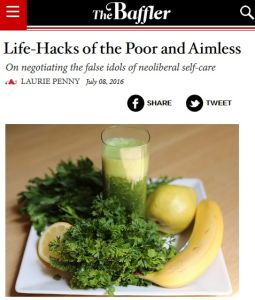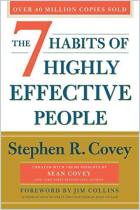
Laurie Penny
Life-Hacks of the Poor and Aimless
On Negotiating the False Idols of Neoliberal Self-Care
The Baffler, 2016
What's inside?
The coercive aspects of modern “wellness” ideologies shouldn’t make “ self-care” anathema to the political left.
Recommendation
Faced with modern “wellness” ideologies which imply that all life’s problems can be solved with a better exercise routine or change in mind-set, it’s little wonder that many on the progressive left reject the notion of self-care altogether. But, as author and editor Laurie Penny persuasively argues in this article, rejecting self-care entirely, in favor of “despair” and unhealthy habits, won’t solve social problems either. Society needs a new view on self-care – one which recognizes its value, as well as its potential for coercion. getAbstract recommends Penny’s perspective to political progressives.
Take-Aways
- Modern “self-care” ideologies encourage people to believe they can fix their unhappiness through personal improvement.
- Yet, self-care ideologies can harm individuals by making them feel every problem they encounter is their own fault and by discouraging “collective engagement.”
- Many on the political left reject self-care on both practical and political levels. Instead, they “fetishize a species of abject hopelessness.”
- Embracing the concept of misery as a social cure, however, doesn’t lead progressives to serve better causes.
- Self-care, paired with love for others, could serve as an act of political resistance.
Summary
The idea that you can exercise or diet your way to a better life may sound attractive, but, ultimately, these and similar “self-care” ideologies simply encourage a critical view of yourself – rather than addressing the socioeconomic issues so many people face today.
Corporations, as well as many on the political right, use modern ideologies of “wellness” and self-care as a way of masking real problems – much as the British Conservative Party did when it encouraged those rendered unemployed by the recession to view their predicament as the result of their own “psychological resistance” to employment. Moreover, self-care ideologies often encourage narcissistic individualism: People get the message that the answer to life’s problems lies with “work[ing] to improve our lives” individually, rather than looking for opportunities for collective action.
“The more frightening the economic outlook and the more floodwaters rise, the more the public conversation is turning toward individual fulfillment as if in a desperate attempt to make us feel like we still have some control over our lives.”
Given the coercive nature of self-care ideologies, it’s little wonder that so many on the progressive left reject self-care, equating it with neoliberalism. Instead of embracing the “power of positive thinking,” they choose to “fetishize a species of abject hopelessness.” There is a problem, however, with the left’s blanket rejection of self-care: Rejecting self-care in favor of “despair” does not, in fact, help progressives more effectively serve the causes they value. Indeed, by rejecting self-care both politically and practically, progressives deny themselves the factors which keep “hope alive and health possible.”
“Late capitalism is as good an excuse of any for not getting out of bed, but huddling under the covers worrying about Donald Trump is a very inefficient way of sticking it to the man.”
Progressives can continue to reject “exploitive” wellness ideologies without making all self-care anathema. Those in the LGBTQ community, for example, have long embraced the notion that “caring for oneself and one’s friends” can itself be part and parcel of the fight for a fairer world. Indeed, true self-care, paired with love for others, can build community. It can help you not to “wallow.” It can serve as an act of resistance against the false narrative that claims loving yourself means your only concern need be your “personal quest for the good life.”
About the Author
Laurie Penny is a contributing editor at the New Statesman. She is the author of five books, most recently, Unspeakable Things.
This document is restricted to personal use only.
My Highlights
Did you like this summary?
Read the articleThis summary has been shared with you by getAbstract.
We find, rate and summarize relevant knowledge to help people make better decisions in business and in their private lives.
Already a customer? Log in here.
















Comment on this summary